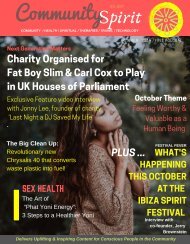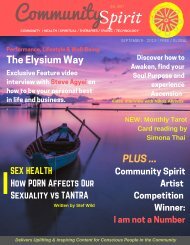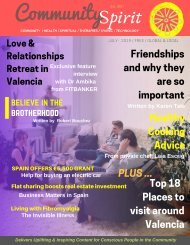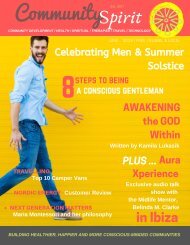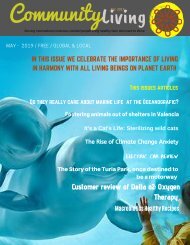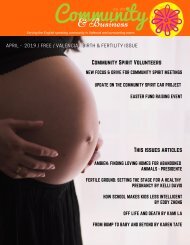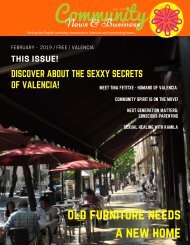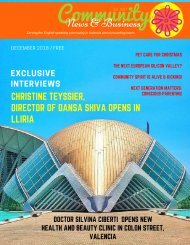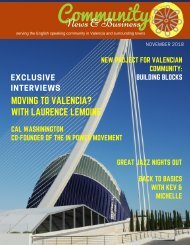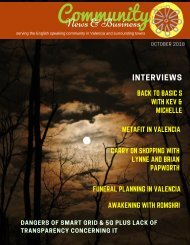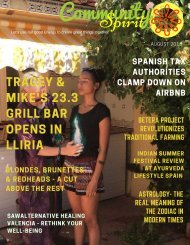Community Spirit, March 2018
Community Spirit emagazine was created in 2017 to help bring the English speaking community closer together in the city and the surrounding towns. And to support individuals and businesses to overcome their challenges of setting up a new life in this beautiful area. Don't miss an issue of the emazine magazine! To subscribe and get all the back issues, visit and send a message to: www.facebook.com/emazinemediaglobal
Community Spirit emagazine was created in 2017 to help bring the English speaking community closer together in the city and the surrounding towns. And to support individuals and businesses to overcome their challenges of setting up a new life in this beautiful area. Don't miss an issue of the emazine magazine! To subscribe and get all the back issues, visit and send a message to: www.facebook.com/emazinemediaglobal
You also want an ePaper? Increase the reach of your titles
YUMPU automatically turns print PDFs into web optimized ePapers that Google loves.
C O M M U N I T Y SPIRIT / ANIMAL WELL BEING<br />
Fireworks phobia in dogs<br />
By María Lluch Barbera (veterinarian) &<br />
Laila Fletcher (student canine behaviourist)<br />
<strong>March</strong> brings the festival of Las Fallas in Valencia, with daily<br />
thunderous explosions of fireworks at 2pm (mascletá) from the<br />
beginning of the month, building up to five days of intense<br />
celebration, and culminating in La Nit del Foc (the night of fire),<br />
when the city erupts in magnificent fireworks displays and the<br />
burning of huge statues (ninots). Spectacular it is, and well worth<br />
seeing, but quiet it is not. Unfortunately for our four-legged friends,<br />
most dogs suffer some level of fear of sudden loud noises (e.g.<br />
fireworks, gunshots, thunder), and 40-50% are what is termed noise<br />
sensitive or phobic. If your dog is whining, panting, pacing, trembling,<br />
hypersalivating, hiding, or refusing to eat food/treats, then she is<br />
probably quite profoundly frightened, and you’ll want to do all you<br />
can to help her cope.<br />
If she is used to a crate, you can cover it with layers of blankets to help<br />
muffle the sound of fireworks (or a Thunder Hut sound-deadening cover<br />
could be bought for it). Only use a crate, however, if your dog normally<br />
chooses to enter it voluntarily. Closing the blinds/curtains of your home<br />
will also help mask loud noises and prevent her seeing flashes of light.<br />
If your dog seeks tactile comfort from you then stroke her soothingly; in<br />
fact, just gentle but continuous pressure with an arm or leg can be<br />
better.<br />
Fear of loud noises is natural in dogs, and there is a strong genetic<br />
component, especially among herding breeds. The best solution to<br />
noise phobias, then, is to prevent them developing in the first place,<br />
by gently and gradually exposing your dog to as many sounds as<br />
possible during puppyhood, always ensuring the sounds are never so<br />
loud as to be overwhelming (we will write more about puppy<br />
sensitive periods in another issue). Of course, this is not possible if<br />
you adopted your dog as an adult, or if she has already developed a<br />
phobia. The key here is to manage your dog’s surroundings, minimise<br />
her exposure to loud noises and help reduce her anxiety – this is<br />
extremely important, as noise phobias tend to worsen over time and<br />
generalise to other situations too.<br />
Firstly, never ever punish your dog whilst she is frightened, as it will<br />
only make her fear worse! If she has a toilet accident or damages<br />
something, quietly clean up the mess and forget about it. If she<br />
wants to hide alone in an unusual place, let her choose where she<br />
feels most safe.




